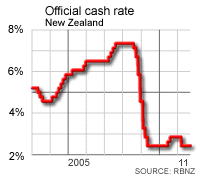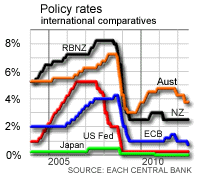 The Reserve Bank of New Zealand has delivered a bigger than expected 150 basis point cut in the Official Cash Rate to a record low 3.5%, arguing a deteriorating global outlook and easing inflation pressures meant it had to add further stimulation to the economy quickly. (Updated with press conference comments, NZ$ reaction, Fed Farmers reaction, Economist forecasts of 2% trough for OCR, Kiwibank and Westpac mortgage rate cuts).
Kiwibank and Westpac cut their 1 year fixed mortgage rates to fresh 5 and a half year lows of around 5.7%, while the New Zealand dollar fell to a 6 year low around 51.9 USc.
Economists said they now expected the OCR to be cut to a low of 2% later this year.
RBNZ Governor Alan Bollard said he now expected the recession to extend through the first half of 2009 because of a global economic slowdown that now looked like being the worst since World War 2.
"The extent of the decline in global growth prospects and the ongoing uncertainty has played a large part in today's decision," RBNZ Governor Alan Bollard said.
"We now expect the impact on New Zealand of these developments to be greater than we did in December, as a result of a more negative outlook for the terms of trade and exports, and tighter credit conditions," Bollard said.
Inflation pressures were abating and the bank was now confident that annual inflation would be comfortably inside the targeted 1-3% over the medium term, he added.
"Given this backdrop, it is appropriate to take the OCR to a more stimulatory position and to deliver this reduction quickly," he said.
The Reserve Bank of New Zealand has delivered a bigger than expected 150 basis point cut in the Official Cash Rate to a record low 3.5%, arguing a deteriorating global outlook and easing inflation pressures meant it had to add further stimulation to the economy quickly. (Updated with press conference comments, NZ$ reaction, Fed Farmers reaction, Economist forecasts of 2% trough for OCR, Kiwibank and Westpac mortgage rate cuts).
Kiwibank and Westpac cut their 1 year fixed mortgage rates to fresh 5 and a half year lows of around 5.7%, while the New Zealand dollar fell to a 6 year low around 51.9 USc.
Economists said they now expected the OCR to be cut to a low of 2% later this year.
RBNZ Governor Alan Bollard said he now expected the recession to extend through the first half of 2009 because of a global economic slowdown that now looked like being the worst since World War 2.
"The extent of the decline in global growth prospects and the ongoing uncertainty has played a large part in today's decision," RBNZ Governor Alan Bollard said.
"We now expect the impact on New Zealand of these developments to be greater than we did in December, as a result of a more negative outlook for the terms of trade and exports, and tighter credit conditions," Bollard said.
Inflation pressures were abating and the bank was now confident that annual inflation would be comfortably inside the targeted 1-3% over the medium term, he added.
"Given this backdrop, it is appropriate to take the OCR to a more stimulatory position and to deliver this reduction quickly," he said.
 "Further movements in the OCR will be assessed against emerging developments in the global and domestic economies and the response to policy changes already in place. We would expect any further reductions to be smaller than those seen recently."
The New Zealand dollar immediately fell to 51.9 US cents from 53.5 US cents.
Kiwibank and BNZ cut their 1 year mortgage rates to under 6% last week in anticipation of the cut and other banks are expected to cut their rates later today.
Kiwibank cut its 1 year rate again to a market-leading 5.69%, while Westpac cut its 1 year rate to 5.79%. See all the latest mortgage rates here in our rates table.
Later in a press conference in Wellington, Governor Bollard said the bank had a lot of room to cut interest rates further if it needed to and had the capacity to lending significant amounts extra to our banks to cope with any further disruptions on international financial markets.
He ruled out instructions to the banks on what interest rates they should charge their customers. He also said the global recession was the worst since World War Two, but has not approached the depths of the Depression.
He said he now expected the New Zealand recession to last through to the end of the first half of 2009 and that he was still concerned about domestic inflation from power companies and councils.
Federated Farmers reissued its call for banks to pass on the cuts.
"The 150 basis point cut will be welcomed by farmers, but only if the banks play ball and pass this large cut onto their business customers," says Philip York, Federated Farmers economics spokesperson
"The Federation applauds Dr Bollard for not just restating, but toughening his language for financial institutions to pass on cuts in the Official Cash Rate (OCR) to customers," York said.
"Given the OCR has been cut by 4.75 percent since last July, the banks are potentially blunting the stimulus the Reserve Bank has given the economy," he said.
"Given Dr Bollard's press conference comments on bank balance sheets and margins, it is clear the banks have looked after themselves. It's high time for the banks to now look after their farm business customers."
Citigroup economist Stephen Halmarick said the statement (below) from the Reserve Bank was "especially dovish".
"After reading today's statement and given the deteriorating global outlook and the limited room for further fiscal easing given credit rating concerns in NZ, we now expect a 100bp easing at the March MPS (previously 50bp) for a new low in the cash rate of 2.5%," Halmarick said.
ASB, ANZ and BNZ all reduced their forecast lows for the OCR to 2%.
Here is the full statement from the Reserve Bank announcing the cut.
"Further movements in the OCR will be assessed against emerging developments in the global and domestic economies and the response to policy changes already in place. We would expect any further reductions to be smaller than those seen recently."
The New Zealand dollar immediately fell to 51.9 US cents from 53.5 US cents.
Kiwibank and BNZ cut their 1 year mortgage rates to under 6% last week in anticipation of the cut and other banks are expected to cut their rates later today.
Kiwibank cut its 1 year rate again to a market-leading 5.69%, while Westpac cut its 1 year rate to 5.79%. See all the latest mortgage rates here in our rates table.
Later in a press conference in Wellington, Governor Bollard said the bank had a lot of room to cut interest rates further if it needed to and had the capacity to lending significant amounts extra to our banks to cope with any further disruptions on international financial markets.
He ruled out instructions to the banks on what interest rates they should charge their customers. He also said the global recession was the worst since World War Two, but has not approached the depths of the Depression.
He said he now expected the New Zealand recession to last through to the end of the first half of 2009 and that he was still concerned about domestic inflation from power companies and councils.
Federated Farmers reissued its call for banks to pass on the cuts.
"The 150 basis point cut will be welcomed by farmers, but only if the banks play ball and pass this large cut onto their business customers," says Philip York, Federated Farmers economics spokesperson
"The Federation applauds Dr Bollard for not just restating, but toughening his language for financial institutions to pass on cuts in the Official Cash Rate (OCR) to customers," York said.
"Given the OCR has been cut by 4.75 percent since last July, the banks are potentially blunting the stimulus the Reserve Bank has given the economy," he said.
"Given Dr Bollard's press conference comments on bank balance sheets and margins, it is clear the banks have looked after themselves. It's high time for the banks to now look after their farm business customers."
Citigroup economist Stephen Halmarick said the statement (below) from the Reserve Bank was "especially dovish".
"After reading today's statement and given the deteriorating global outlook and the limited room for further fiscal easing given credit rating concerns in NZ, we now expect a 100bp easing at the March MPS (previously 50bp) for a new low in the cash rate of 2.5%," Halmarick said.
ASB, ANZ and BNZ all reduced their forecast lows for the OCR to 2%.
Here is the full statement from the Reserve Bank announcing the cut.
The Reserve Bank today reduced the Official Cash Rate (OCR) from 5.0 percent to 3.5 percent. Reserve Bank Governor Alan Bollard commented that "the news coming from our trading partners is very negative. The global economy is now in recession and the outlook for international growth has been marked down considerably since our December Monetary Policy Statement. "Globally, there has been considerable policy stimulus put in place and we expect this to help bring about a recovery in growth over time. However, there remains huge uncertainty about the timing and strength of a recovery."The extent of the decline in global growth prospects and the ongoing uncertainty has played a large part in today's decision. We now expect the impact on New Zealand of these developments to be greater than we did in December, as a result of a more negative outlook for the terms of trade and exports, and tighter credit conditions. "Inflation pressures are abating. We have confidence that annual inflation will be comfortably inside the target band of 1 to 3 percent over the medium term. "Given this backdrop it is appropriate to take the OCR to a more stimulatory position and to deliver this reduction quickly. "Today's decision brings the cumulative reduction in the OCR since July 2008 to 4.75 percentage points. Lower interest rates will have a positive impact on growth, alongside a lower exchange rate and fiscal stimulus, provided firms and households do not unnecessarily contract their spending. "To ensure the response we are seeking, we expect financial institutions to play their part in the economic adjustment process by passing on lower wholesale interest rates to their customers. This will help New Zealand respond flexibly. "Further movements in the OCR will be assessed against emerging developments in the global and domestic economies and the response to policy changes already in place. We would expect any further reductions to be smaller than those seen recently."

We welcome your comments below. If you are not already registered, please register to comment
Remember we welcome robust, respectful and insightful debate. We don't welcome abusive or defamatory comments and will de-register those repeatedly making such comments. Our current comment policy is here.